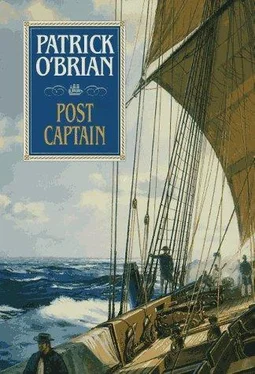Patrick O'Brian - Post captain
Здесь есть возможность читать онлайн «Patrick O'Brian - Post captain» весь текст электронной книги совершенно бесплатно (целиком полную версию без сокращений). В некоторых случаях можно слушать аудио, скачать через торрент в формате fb2 и присутствует краткое содержание. Жанр: Книги. Описание произведения, (предисловие) а так же отзывы посетителей доступны на портале библиотеки ЛибКат.
- Название:Post captain
- Автор:
- Жанр:
- Год:неизвестен
- ISBN:нет данных
- Рейтинг книги:5 / 5. Голосов: 1
-
Избранное:Добавить в избранное
- Отзывы:
-
Ваша оценка:
- 100
- 1
- 2
- 3
- 4
- 5
Post captain: краткое содержание, описание и аннотация
Предлагаем к чтению аннотацию, описание, краткое содержание или предисловие (зависит от того, что написал сам автор книги «Post captain»). Если вы не нашли необходимую информацию о книге — напишите в комментариях, мы постараемся отыскать её.
Post captain — читать онлайн бесплатно полную книгу (весь текст) целиком
Ниже представлен текст книги, разбитый по страницам. Система сохранения места последней прочитанной страницы, позволяет с удобством читать онлайн бесплатно книгу «Post captain», без необходимости каждый раз заново искать на чём Вы остановились. Поставьте закладку, и сможете в любой момент перейти на страницу, на которой закончили чтение.
Интервал:
Закладка:
The Lord Nelson was ready long before the cutter fired a gun and hoisted English colours; but she did not reply at once. Azéma looked at Jack and Pullings. ‘I will not ask you to go downstairs,’ he said, ‘but if you will to hail or to signal, I shall be compelled to shoot you.’ He smiled, but he had two pistols in his belt and he meant what he said.
Jack said, ‘Just so,’ and bowed. Pullings smiled diffidently.
The cutter was lying on the Indiaman’s bow, her mainsail shivering; Azéma nodded to the man at the wheel. The Lord Nelson turned gently, and Azéma said, ‘Fire.’ The broadside, the eighteen-pounders alone, parted on the downward roll; beautifully grouped, the shots struck the sea just short of the cutter’s larboard bow and beam, ricocheting over her, adding new holes to her sails and knocking away the outer third of her bowsprit. Startled by this reception, the cutter tried to fill and come about, but with so little way on her and with her jib flying in the breeze she would not stay. She fell off, giving the Lord Nelson her seven six-pounders as she did so, and wore round on the other tack.
The cutter knew she had come up against a tough’un, a difficult article - half a broadside like this would send her to the bottom; but gathering way she crossed the Lord Nelson’s stern, fired again, gybed like a dancer and crossed back to lie upon her starboard bow. At two hundred yards her six-pounders did the Indiaman’s thick sides no harm, but they did cut up her rigging, and it was clearly in the cutter’s mind to carry on with this manoeuvre.
Azéma was having none of it. The cutter had gone to and fro in spite of his yawing to fire, and now he brought the wind right abeam, swinging the ship through 90°. He ran down the line of guns, speaking to each crew, and sent a deliberate broadside to the space of sea the cutter had filled two seconds earlier - as though by magic, intuition, telepathy, the cutter’s master put his helm a-lee the instant of the call to fire, coming about in a flash and heading for the Lord Nelson. He did so again two minutes later, less by magic than by a calculation of the time it would take these gunners to have him in their sights again. He was going to board, and he had only one more short tack to bring him up against the Lord Nelson’s bows. Jack could see the men there, cutlasses and boarding-axes ready, twenty-five or thirty of them, the master at the tiller, a long sword in his other hand: in a moment now they would start their cheer.
‘Fire,’ said Azéma again, and as the smoke cleared there was the cutter with her topsail gone, hanging drunkenly over her side, no captain at the tiller, a heap of men struggling or motionless upon her deck. Her way carried her on past the Lord Nelson’s bows, out of reach of the next discharge; and now she was racing away, fleeing to gain a hundred yards or so before the Lord Nelson’s ponderous turn should bring her starboard broadside to bear.
She survived it, though it was difficult to see how she did so, with so much white water kicked up all round her; and Azéma, who did not feel passionately about either taking or sinking her, sent only a few more shots after her before returning to his course. Ten minutes later she had sent up a new jib and foresail and she was dwindling, smaller and smaller among the distant bankers. Jack felt for his watch; he liked to note the beginning and the end of all engagements - it was gone, of course.
‘I think it was temerarious, immoral,’ said Azéma. ‘Suppose he had killed some of my people! He should be broken on the wheel. I should have sunk him. I am too magnanimous. That is not courage, but hardfooliness.’
‘I would agree,’ said Jack, ‘if it had been the other way around. A sloop that does not strike to a ship of the line is a fool.’
‘We see things differently,’ said Azéma, still cross over the time lost and the damage to his rigging. ‘We have different proportions. But at least’ - his good humour returning - ‘I hope your countrymen will give us a day of rest tomorrow.’
He had his day of rest, and another morning too; but shortly after he had taken his noon observation - 45° 23′ N., 10° 30′ W. - and had promised his prisoners Spanish bread and real coffee for breakfast, there was the cry of a sail to windward.
Gradually the white blur resolved itself into a brig; and the brig was clearly giving chase. The hours passed:
Captain Azéma was thoughtful and preoccupied during dinner - pecked at his food, and from time to time going up on deck. The Lord Nelson was under topgallants, with upper and lower studdingsails, which urged her towards Corunna at five or even six knots as the breeze freshened. He set his royals a little after four, anxiously watching to see how the wounded masts would stand the strain; and for a while it seemed that the brig was falling behind.
‘Sir,’ said Pullings secretly, coming from those airy heights after a long examination of the brig, ‘I am almost sure she is the Seagull. My uncle was master of her in ninety-nine, and many’s the time I have been aboard.’
‘Seagull?’ said Jack, frowning. ‘Did she not change to carronades?’
‘That’s right, sir. Sixteen twenty-four-pounders, very tight in the bridle-ports: and two long sixes. She can hit hard, if only she gets near enough, but she is amazing slow.’
‘Slower than this?’
‘Much of a muchness, sir. She’s just set her skysails. It may make a difference.’
The difference was small, very small - perhaps a tablecloth or two - but in five hours of steady unchanging weather it was enough to bring the Seagull within reach of the Lord Nelson’s aftermost starboard eighteen-pounder and of a long eight that Captain Azéma had shifted to fire through the stateroom gallery.
For ten sea miles the brig - and now they were sure she was the Seagull - could reply only with her bow six-pounder, which did nothing but make a smoke and encourage her crew; but slowly the Lord Nelson neared and then crossed a dark band in the sea, where the wind, backed up by the Spanish Cordillera, combined with the ebbing tide to produce a distinct frontier, a sullen, choppy zone haunted by gulls and other inshore birds.
Within five minutes the Lord Nelson’s way fell off perceptibly; the song of her rigging dropped tone by tone; and the Seagull ranged up to her starboard quarter. Before the brig crossed the dark water in her turn, she fired the first full broadside of her close-range carronades: it fell short, and so did the next, but a ricocheting twenty-four-pound ball tore through the hammocks and dropped weakly against the mainmast. Captain Azéma looked thoughtfully from the heavy shot to the brig: she still had a quarter of a mile to run before she would lose the full fair breeze. A gain of fifty yards would bring these twenty-four-pounders rattling about his ears, piercing the Indiaman’s costly sides and endangering her already damaged masts. His chief feeling was irritation rather than any dread for the outcome: the Seagull’s rate of fire and accuracy left much to be desired, whereas he had eight master-gunners aboard; the brig’s power of manoeuvring was no greater than his, and he only had to knock away a spar or two to leave her behind and gain the coast. Nevertheless, he was going to need all his concentration.
‘She is scarcely commodious, your brig,’ he said to Jack. ‘We may have serious difficulty with her. I must ask you to go below. Messiers les prisonniers into the hold, if you please - I invite the prisoners to go into the hold.’
There was no denying his authoritative tone. They went below with many a reluctant glance at the evening sea, down hatchway after hatchway to the final grating, which
closed over them with a thump and the rattle of a chain. And it was in the crammed bowels of the Indiaman, shut firmly down in the smell of tea, cinnamon and bilgewater that Jack, Pullings, the Company’s Europeans and all the passengers witnessed the action. Aural witnesses, of course, no more, since they were below the water-line, with nothing but a swinging lantern and the vague shape of bales to see, but what they heard they heard well. The Lord Nelson resonated like a sounding-box to the crash of her eighteen-pounders, transposing the roar an octave lower; and the sea transmitted the Seagull’s broadsides
Читать дальшеИнтервал:
Закладка:
Похожие книги на «Post captain»
Представляем Вашему вниманию похожие книги на «Post captain» списком для выбора. Мы отобрали схожую по названию и смыслу литературу в надежде предоставить читателям больше вариантов отыскать новые, интересные, ещё непрочитанные произведения.
Обсуждение, отзывы о книге «Post captain» и просто собственные мнения читателей. Оставьте ваши комментарии, напишите, что Вы думаете о произведении, его смысле или главных героях. Укажите что конкретно понравилось, а что нет, и почему Вы так считаете.












